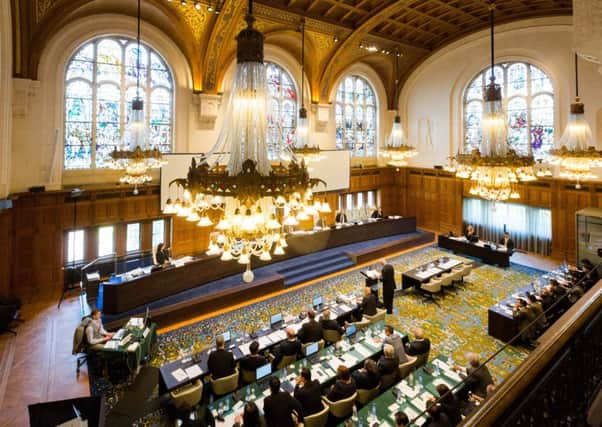Philippines hail Hague ruling in South China Sea dispute
This article contains affiliate links. We may earn a small commission on items purchased through this article, but that does not affect our editorial judgement.


The tribunal issued its ruling in The Hague in response to an arbitration case brought by the Philippines against China.
The panel said that any historic rights to resources that China may have had were wiped out if they are incompatible with exclusive economic zones established under a UN treaty.
Advertisement
Hide AdAdvertisement
Hide AdThe Philippine government welcomed the ruling by the Permanent Court of Arbitration.
The country’s foreign secretary Perfecto Yasay said the “milestone decision” was an important contribution to efforts in addressing disputes in the sea.
He said: “The Philippines reiterates its abiding commitment to efforts of pursuing the peaceful resolution and management of disputes with the view of promoting and enhancing peace and stability in the region.”
The tribunal also criticised China for building a large artificial island on Mischief Reef in the South China Sea, saying it caused “permanent irreparable harm” to the coral reef ecosystem and permanently destroyed evidence of the natural conditions of the feature.
The ruling concluded that China had violated its obligations to refrain from aggravating the dispute while the settlement process was still going on.
The tribunal also found that China had interfered with Philippine petroleum exploration at Reed Bank, tried to stop fishing by Philippine vessels within the country’s exclusive economic zone, and failed to prevent Chinese fishermen from fishing within the Philippines’ territory at Mischief Reef and Second Thomas Shoal.
How Beijing responds to the ruling could chart the course of global power relations in an increasingly dangerous area.
It comes as the US, which counts the Philippines as an ally, ramps up its military presence in the region and could seek to marshal world opinion to pressure Beijing into complying with the verdict.
Advertisement
Hide AdAdvertisement
Hide AdA new Philippine leader, Rodrigo Duterte, who appears friendlier to Beijing, could also influence the aftermath of the ruling.
The Hague-based tribunal ruled on a 2013 case which challenged the so-called nine-dash line China uses to claim virtually the entire South China Sea. Manila opposes this, because it infringes upon its own 200-mile exclusive economic zone.
The dispute centres on waters through which an estimated five trillion US dollars (£3.85 trillion) in global trade passes through each year and are home to rich fishing stocks and a potential wealth of oil, gas and other resources.
China, which has boycotted the case, has summoned its demobilised sailors and officers for training drills in exercises that apparently started just days ago.
The People’s Liberation Army Daily newspaper said on social media that Chinese navy reserves have been called up to perform “functional tasks”.
The post followed online rumours that reservists in central Chinese provinces have been called up for an unspecified mission from July 10-22.
In the Philippines, more than 100 left-wing activists marched to the Chinese Consulate in metropolitan Manila. They called their campaign to push China out of the South China Sea, “CHexit” or “China exit now”.
Vietnam, meanwhile, accused Chinese vessels of sinking a Vietnamese fishing boat in disputed waters.
Advertisement
Hide AdAdvertisement
Hide AdNguyen Thanh Hung, a local fisheries executive in the central province of Quang Ngai, said two Chinese vessels chased and sank the Vietnamese boat on Saturday as it was fishing near the Paracel islands.
The fishermen were rescued by another fishing trawler around seven hours later.
China has argued that the tribunal has no jurisdiction and says it will not accept the ruling. Officials insist that bilateral talks between Beijing and other claimants is the only way to address the dispute.
Findings of the tribunal are binding on the parties, including China. But the court - without police or military forces or a system of sanctions at its disposal - cannot enforce its ruling, so its potential impact remains unclear.
DOWNLOAD THE SCOTSMAN APP ON ITUNES OR GOOGLE PLAY
